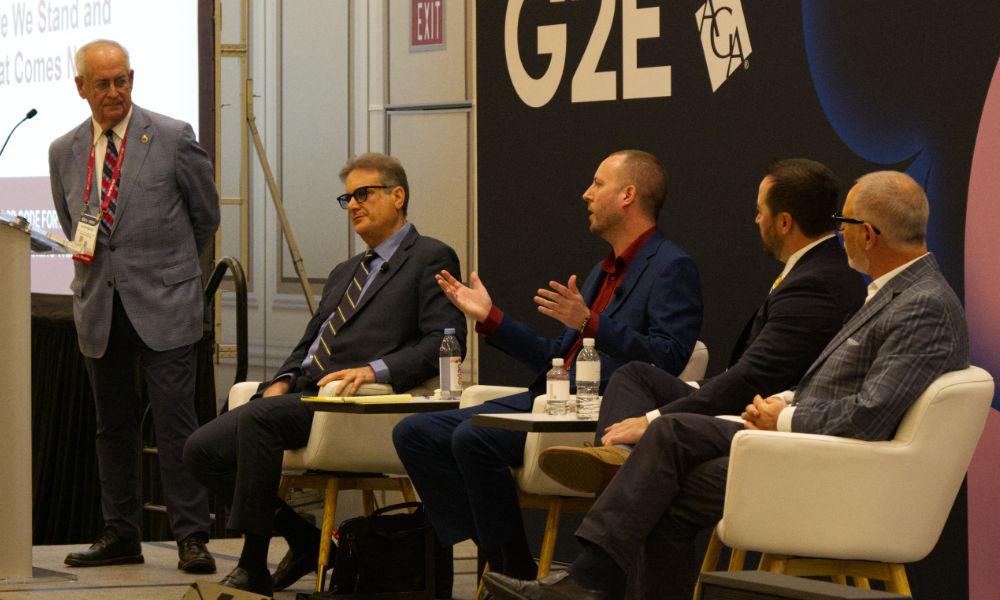Prediction markets, a Las Vegas Strip slowdown, and the mergers-and-acquisitions “party” for real estate investments trusts were among the hottest topics at last week’s G2E in Las Vegas, according to a Wall Street analyst.
G2E had more limited opportunities on the manufacturing front as the show saw more U.S. investor focus on operators, digital and REITs.
Barry Jonas with Truist Securities said, “Prediction markets were the hot topic at G2E, given rising contract volumes and improving products have hit valuations on the bulk of our digital-gaming coverage. Consensus was still largely that the actual impact of prediction markets to date has been limited in states where online sports betting is live, with the bulk of prediction revenue in states without OSB (Texas and California).”
Many management teams pointed to the prediction-market model having been live in the UK for decades with limited efficacy in the market. Others believe prediction markets could be a catalyst for new regulated online sports betting and igaming legalization, while limiting existing tax rate creep, Jonas said.
On the heels of its deal with CME Group, Flutter indicated it’s likely to roll out some sort of exchange-based wagering in the fourth quarter, Jonas said.
“This may include sports contracts, as management seemed to believe regulatory risks could be manageable,” Jonas said. “We are less certain how manageable the situation may be, with the environment evolving daily. Some contacts believe a recent U.S. district court ruling in Nevada against sports contracts has potentially wider ramifications. Bottom line, we don’t see full resolution of the sports prediction question for some time, but see sizable opposition.”
David Katz with Jefferies Equity Research agreed that prediction markets were the focal discussion point. The consensus is they’re likely to act as a catalyst for new online sports betting regulation. While legal processes are likely longer term, operators, states, leagues, and tribes are likely to drive regulatory solutions, he added.
Operators indicate no notable impact from predictions in regulated states, driven by superior product, pricing, generosity capabilities, and customer demographics, Katz said.
“Our meetings with Flutter’s CEO and other industry participants make us more confident than ever that Flutter is best placed to win,” Katz said. “Prediction market headlines will force a legal path to either prediction market legalization, further online sports betting legalization, or both. OSB will prevail when offered beside prediction markets, in our view. Sweepstakes are driving the same debate for igaming legalization. We see multiple positive avenues for Flutter, given leading OSB and prediction market capabilities.”
Jonas also wrote about the mergers-and-acquisition realm. REIT management teams noted the potential for more sale-leaseback deals over the next 18 months if interest rates continue to fall and markets behave.
“Despite the volatility this year, GLPI has been active recently, with VICI more successful this year in building out its loan book, noting continuing demand,” Jonas said. “Tribal sale-leaseback-style deals remain a tricky subject with GLPI more active, but VICI is still more cautious, looking for the right partner and structure.”
In a report on the Las Vegas Strip, Jonas said the summer was slow with midweek demand, lower-end malaise and slower international visitation the primary culprits. He added, however, strength has remained on the weekends, especially for marquee events and at higher-end properties, with gaming revenues overall remaining sticky.
“Commentary seems to be improving with a more positive outlook on the fourth quarter. Multiple operators believe F1 will be more robust after a sophomore slump and into 2026 led by a strong event calendar. Everyone we spoke with expected record group business in the full year 2026. While many operators believe Vegas PR concerns may be overblown, there is an operator-increasing focus on the importance of delivering more value at all price points.”
Regional gaming may be benefiting from consumers trading down at the expense of Las Vegas and other destination markets, Jonas said. At the same time, Caesars has been using promos more to combat new competitive supply, moving that strategy to other markets too. Management’s strategy is targeted and rational, not looking to start a promo war, he said.
The Las Vegas locals market has continued to show its strength in the seasonally slowest time of year despite Strip malaise, Jonas said. Management teams were confident they won’t see Strip spillover, unless Strip weakness is prolonged.
There was no shortage of solid slot content from a slew of manufacturers, Jonas said, noting they didn’t sense any clear winners. With Aussie-bound Light & Wonder and Aristocrat “increasingly churning out impressive land-based content,” both remain committed to translating that success in multiple channels – igaming and social.
Katz said investors continue to examine new product angles and moats. Playtech and MGM’s “Live from Vegas” studio now broadcasts live casino-game shows and table games to more than 70 operators across nine regulated markets globally, live from the MGM Grand casino floor. BETCO’s Playbook leverages the social aspect of betting to allow consumers to share and access AI-generated bet slips directly within X. Among land-based EGM developers, Light & Wonder and AGS and Bluberi continue to demonstrate strong core product momentum, Katz said.
AI continues to present opportunities for efficiencies across both land-based and digital ecosystems, Katz said. KAMBI’s AI trading is driving cost savings and presents a compelling platform for small and medium-sized operators. Flutter’s commentary suggests a potentially profound impact on the industry, with early wins overshadowed by recent market noise.


